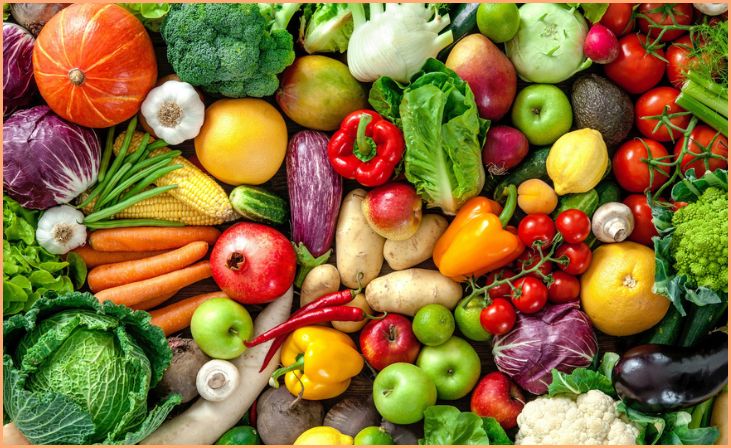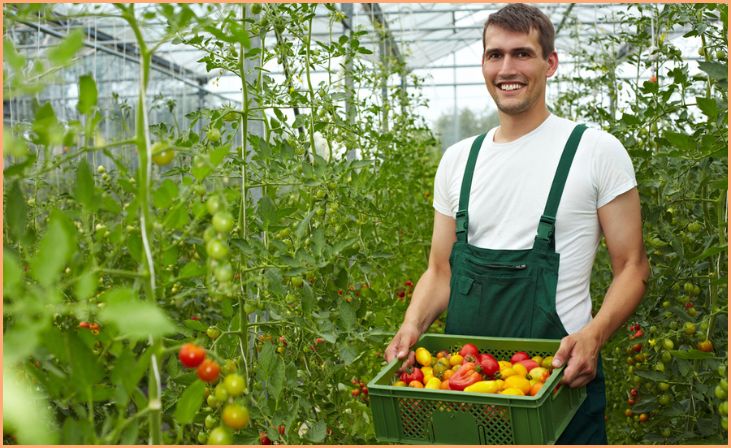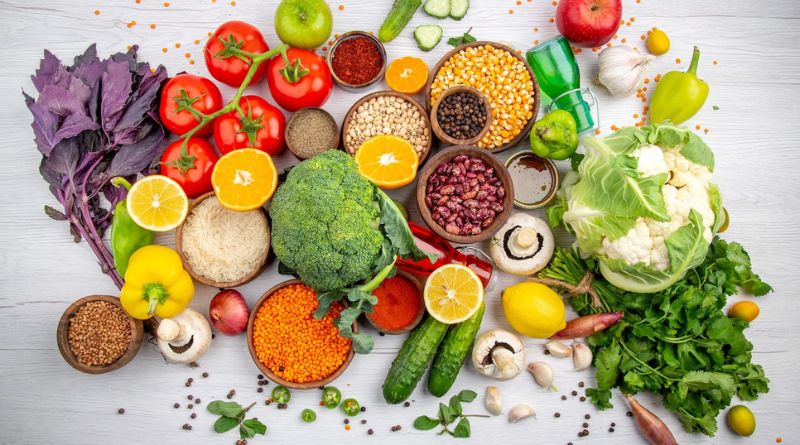In an era where conscious consumption is gaining prominence, the choice to embrace organic food has become a pivotal aspect of holistic well-being. In recent years, there has been a growing interest in organic food, with more and more people opting for organic produce and products. Organic food refers to food that is grown and produced without the use of synthetic pesticides, fertilizers, genetically modified organisms (GMOs), or other artificial additives. While organic food may come with a slightly higher price tag, it offers numerous benefits for both our health and the environment.
In this blog post, we will explore ten benefits of eating organic food. This blog post explores the myriad benefits of choosing organic food over conventional options. From fostering environmental sustainability to reducing exposure to pesticides, the advantages extend beyond individual health to encompass broader ecological considerations.
As we delve into the ten compelling benefits of incorporating organic food into your diet, it becomes clear that this mindful choice resonates not only with personal wellness but also with a commitment to sustainable practices that nourish both individuals and the planet.
Amazing Benefits of Organic Food
Organic food has gained significant popularity in recent years, and for good reason. With growing concerns about health, environmental sustainability, and the impact of conventional farming practices, many individuals are opting for organic choices. In this article, we’ll explore the top 10 benefits of eating organic food, ranging from health advantages to environmental benefits.
No Synthetic Pesticides or Fertilizers
The allure of organic food is anchored in its cultivation free from synthetic pesticides or fertilizers, a stark departure from conventional farming practices reliant on these chemicals. The avoidance of these toxins in organic farming serves as a primary driver for health-conscious consumers. Synthetic pesticides and fertilizers used in conventional methods pose potential harm to human health and contribute to environmental degradation. By choosing organic, individuals opt for a safer and cleaner food option, mitigating their exposure to harmful substances.
This commitment to pesticide-free and environmentally friendly farming practices not only safeguards personal well-being but also reflects a broader dedication to sustainable and mindful consumption. Embracing organic food becomes a deliberate choice to prioritize health and environmental stewardship, fostering a connection between what we consume and the world we inhabit.
Quick Link: The 7 Best Foods for Lung Health: Nourishing Your Respiratory System
Higher Nutrient Content

The nutritional superiority of organic food is attributed to the health of the soil in which organic crops flourish. Organic farming practices prioritize soil health, fostering nutrient-rich conditions that transcend into the produce. The flourishing ecosystem of organic soil translates into more nutritious and flavorful yields, delivering an abundance of vitamins, minerals, and antioxidants. This commitment to soil vitality distinguishes organic agriculture, offering consumers a tangible and holistic benefit in the form of nutrient-dense food options.
By choosing organic, individuals align with a sustainable food system that prioritizes the health of both the environment and the end consumer. This connection between soil health and nutritional richness underscores the profound impact of organic choices on personal well-being and the broader ecological landscape. Embrace the nutrient-packed goodness of organic food, recognizing it as a deliberate step towards a more nourishing and sustainable dietary experience.
Better for the Environment
Organic farming stands as a beacon of environmental sustainability, embodying practices that prioritize the health of the planet. Designed to promote biodiversity, these methods foster a thriving ecosystem that supports diverse plant and animal life. Conservation of water resources is integral to organic farming, emphasizing responsible and efficient water usage.
The commitment to soil health in organic practices not only enhances nutrient content but also contributes to sustainable agriculture. The avoidance of synthetic chemicals becomes a cornerstone, minimizing pollution and mitigating the negative impact on ecosystems. By choosing organic, individuals actively engage in a holistic approach to agriculture, acknowledging the interconnectedness of environmental well-being and personal health.
Embrace the environmental stewardship inherent in organic farming, recognizing it as a conscientious choice for a sustainable and harmonious relationship with the Earth.
No Genetically Modified Organisms (GMOs)
Amidst concerns about the long-term effects of genetically modified organisms (GMOs) on human health, organic food emerges as a reassuring choice. Organic produce is inherently free from GMOs, as it is cultivated without genetic alterations to achieve specific traits. The avoidance of GMOs in organic farming becomes a key driver for health-conscious consumers seeking to minimize potential risks associated with these genetically engineered organisms.
By choosing organic, individuals make a deliberate decision to sidestep the uncertainties linked to GMO consumption, aligning with a natural and unaltered approach to food. This commitment to GMO-free agriculture not only reflects personal health concerns but also contributes to a broader movement towards transparent and responsible food choices.
Embrace the reassurance of organic food, recognizing it as a pathway to a more natural, unmodified, and health-conscious dietary experience.
Better for Animal Welfare
Organic standards extend beyond plant cultivation to encompass the humane treatment of animals. In organic farming, livestock welfare is a paramount consideration, with animals raised in conditions designed to prioritize their well-being. This commitment includes providing access to outdoor spaces, allowing animals to express natural behaviors, and fostering a healthier environment.
Organic livestock is treated with care and respect, acknowledging the intrinsic value of each individual animal. The guidelines for humane treatment in organic standards go beyond mere compliance, reflecting a dedication to ethical and compassionate practices. By choosing organic, individuals align with a system that recognizes and prioritizes the welfare of animals, contributing to a more ethical and sustainable food production cycle.
Embrace the holistic approach of organic standards, acknowledging the interconnectedness of plant and animal well-being in a conscientious and compassionate agricultural model.
Also Check: Natural Relief: 6 Food Items to Ease Menstrual Cramps
Support for Local Farmers

The choice to embrace organic food extends beyond personal health benefits; it becomes a supportive gesture towards local farmers. Many organic farmers adopt sustainable practices, emphasizing environmental consciousness and community well-being. By choosing organic, individuals actively contribute to the growth of local food systems, fostering a more resilient and interconnected community.
The commitment to organic aligns with a holistic approach that considers the impact of food choices on both personal health and the vitality of local economies. This symbiotic relationship between consumers and local farmers creates a cycle of sustainability, reinforcing the importance of community-supported agriculture.
Through organic choice, individuals become integral participants in building a more sustainable and locally rooted food system, emphasizing the role of conscientious consumption in shaping vibrant communities. Embrace the ripple effect of your organic choices, recognizing them as not only a personal investment in health but also as a direct support to the flourishing tapestry of local agriculture.
No Antibiotics or Growth Hormones
In the realm of organic livestock farming, a notable distinction emerges—the absence of antibiotics and growth hormones. This conscientious choice aligns with the broader concern over antibiotic resistance, a consequence of their overuse in conventional farming. Organic practices prioritize animal health through natural means, foregoing the routine use of antibiotics to mitigate the risk of antibiotic-resistant bacteria development.
By opting for organic, individuals actively contribute to a sustainable and responsible farming model that safeguards both animal welfare and public health. The significance lies not only in personal well-being but in the collective effort to mitigate the growing threat of antibiotic resistance, emphasizing the interconnectedness of farming practices and public health outcomes.
Embrace the organic choice as a deliberate step towards a healthier and more sustainable future, recognizing its role in safeguarding both animal and human well-being.
Better Taste
The delightful aspect of choosing organic food extends to the palate, where superior taste becomes a distinct pleasure. Organic produce often captivates with a more natural and vibrant flavor, an experience that stands out when compared to conventionally grown counterparts. The careful cultivation practices in organic farming contribute to the richness and authenticity of the taste, making each bite a sensorial delight.
Many individuals discover that the enhanced flavor of organic food not only elevates the culinary experience but also makes mealtime more enjoyable and satisfying. By embracing organic, individuals cultivate an appreciation for the genuine and robust tastes inherent in naturally grown produce, turning each meal into a flavorful celebration of wholesome goodness.
Embrace the culinary richness of organic choices, recognizing the added dimension it brings to the enjoyment of food, creating a more gratifying and palate-pleasing dining experience.
Non-Toxic
A fundamental distinction in the organic choice lies in the absence of synthetic additives, preservatives, and artificial flavors, a departure from the composition of many conventional foods. Organic food champions a commitment to purity, ensuring that what reaches your plate is free from harmful substances.
The absence of synthetic additives in organic produce aligns with a dedication to natural and non-toxic consumption. This deliberate choice not only contributes to personal well-being by minimizing exposure to artificial elements but also fosters a deeper connection to the authentic flavors of wholesome ingredients.
Embracing organic becomes a conscious step towards a cleaner and more transparent food experience, reflecting a commitment to genuine, unadulterated nourishment. Recognize the value of this purity in your food choices, acknowledging its role in creating a healthier, more natural, and flavor-rich dining experience.
Less Processed

A distinctive characteristic of organic food lies in its less processed nature compared to conventional alternatives. Organic options are often closer to their natural state, preserving their nutritional integrity and essential goodness. This minimal processing ensures that the inherent nutrients and flavors of the food remain intact. By choosing organic, individuals prioritize a more wholesome and unadulterated culinary experience.
The commitment to less processing reflects a conscious choice for food that is closer to its original form, fostering a deeper connection to the essence of each ingredient. Embracing organic becomes a deliberate step towards a simpler and more transparent food journey, where the focus is on genuine, minimally altered nourishment. Recognize the value of this less processed approach in your dietary choices, appreciating its role in cultivating a healthier and more authentic relationship with the food you consume.
The decision to include more organic food in your diet comes with a multitude of benefits. From safeguarding your health to supporting sustainable farming practices and promoting animal welfare, the advantages of organic eating are compelling. By making conscious choices about the food you consume, you contribute to a healthier you and a healthier planet.
Bottom Line
The decision to prioritize organic food is more than a dietary choice; it’s a conscientious step towards a healthier, more sustainable lifestyle. The ten benefits outlined in this blog post underscore the multifaceted advantages of choosing organic, encompassing personal well-being, environmental stewardship, and a commitment to sustainable agricultural practices. As consumers increasingly recognize the interconnectedness of their choices, embracing organic food becomes a powerful act of self-care and a contribution to a healthier planet.
FAQs
While organic food can be pricier than conventional options, many individuals find the benefits, both in terms of personal health and environmental impact, outweigh the additional cost. Prioritizing certain organic items based on the “Dirty Dozen” list can also be a strategic approach for budget-conscious consumers.
Look for reputable certifications such as the USDA Organic label. Certification ensures that the food adheres to specific organic farming standards. Additionally, buying from trusted sources, such as local farmers’ markets or reputable grocery stores, enhances the reliability of organic claims.
While research varies, some studies suggest that organic foods may contain higher levels of certain nutrients. However, the primary appeal of organic lies in reduced exposure to pesticides and the promotion of sustainable farming practices rather than solely on nutritional content.
Gradual transitions can be more manageable for some individuals, allowing them to adapt to new dietary habits. It’s essential to prioritize the items that matter most to you and align with your values, making the shift to organic a sustainable and achievable lifestyle change.







